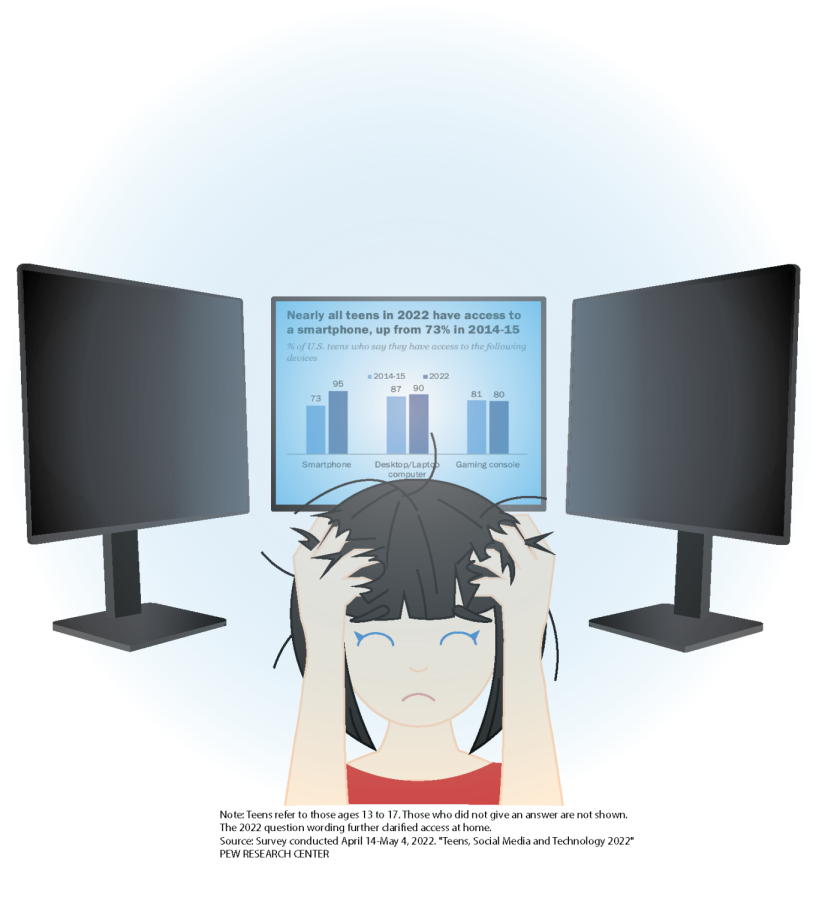When ARPANET (now known as the internet) was launched in 1969, no one could have predicted the massive effects it would have on the human race as a whole. Over 50 years later, the internet has become an integral part of our day to day lives. With the world’s library of information at the touch of a button, the idea of splitting attention and multitasking has become quite popular.
Overstimulation is also becoming a larger problem. Overstimulation is defined as an excessive amount of physical or psychological stimulus, and with roughly 2.5 quintillion bytes of data uploaded to the internet each day, overstimulation seems to be more of an inevitability than a possibility.
“Y’all live in a digital world where you’re used to getting five things at once,” Guidance Counselor Rylan Smith said. “So I think between the phone and the computer and whatever other devices you have, it [all] comes at you quick,”
Pew Research Center reports that 54% of teens surveyed say it would be hard to give up social media. The addictive and instant gratification of platforms such as Instagram and TikTok is shown to reduce attention spans. These platforms are designed to keep the user on the app as much as possible, in order to increase the amount of advertisements seen by the user. In order to do this, these platforms offer massive swaths of content, which can lead to overstimulation.
Pew Research Center also reports that 46% of teens say they use the internet almost constantly, a 22% increase from their last survey in 2014. To put this in perspective, there are about 1.3 billion adolescents in the world today. That means that an estimated 598,000,000 teens use the internet “almost constantly”. These numbers, while staggering, do require additional context. To be specific, part of that time could be spent viewing educational resources online or doing online homework assignments. It is also important to keep in mind that these numbers are not to be used as concrete facts, but rather as tools for estimation.
Overstimulation is not the only negative aspect of frequent online usage, as studies have shown that multitasking has become more popular in recent years.
“I think [that] social media, and some of these other resources have given us the false idea that we can multitask,” Smith said.
Research from “The American Journal of Pharmaceutical Education” supports this idea that multitasking is generally unproductive, finding that the students in the study who were multitasking performed the tasks given slower than those who were not multitasking. This is further backed up by research conducted in 2018 which showed that students who frequently multitask tend to have lower college GPAs. Multitasking appears to be a response to the amount of overstimulation provided by the internet.
Overexposure to the internet in humans is a phenomenon that has not been fully explored, however preliminary research using mice does provide a look into the effects of overstimulation. A 2012 study published in “Nature” found that overstimulated mice are generally worse at recognizing new objects. Furthermore, a study published in “Physiology and Behavior, Volume 233” found that audiovisual overstimulation in childhood led to hyperactivity in adult mice. This data should be taken with a grain of salt, but it does seem to indicate that overexposure to the internet does have harmful effects on the brain.
Ultimately, the internet is becoming a larger presence in the world as a whole. As it becomes a consistent factor in our lives, research shows that it is generally beneficial to unplug whenever possible.




